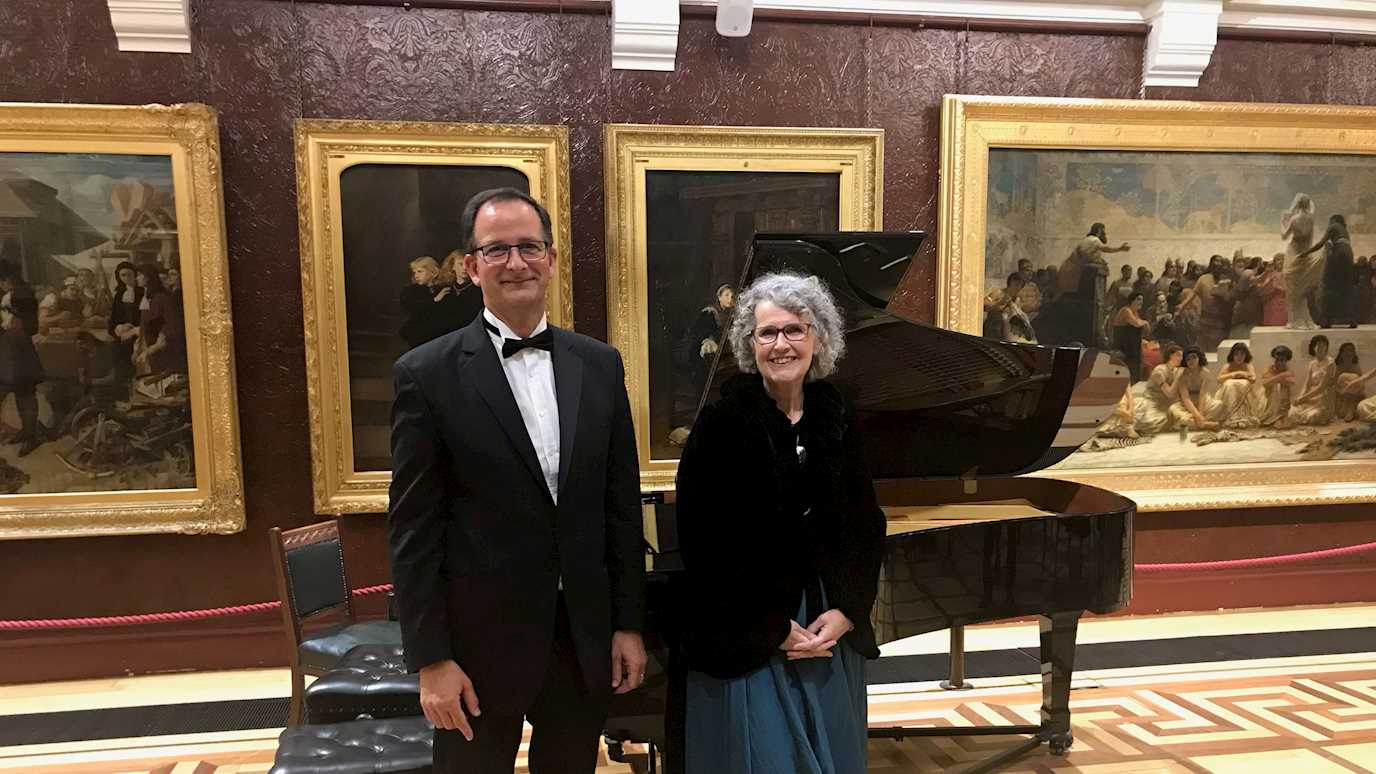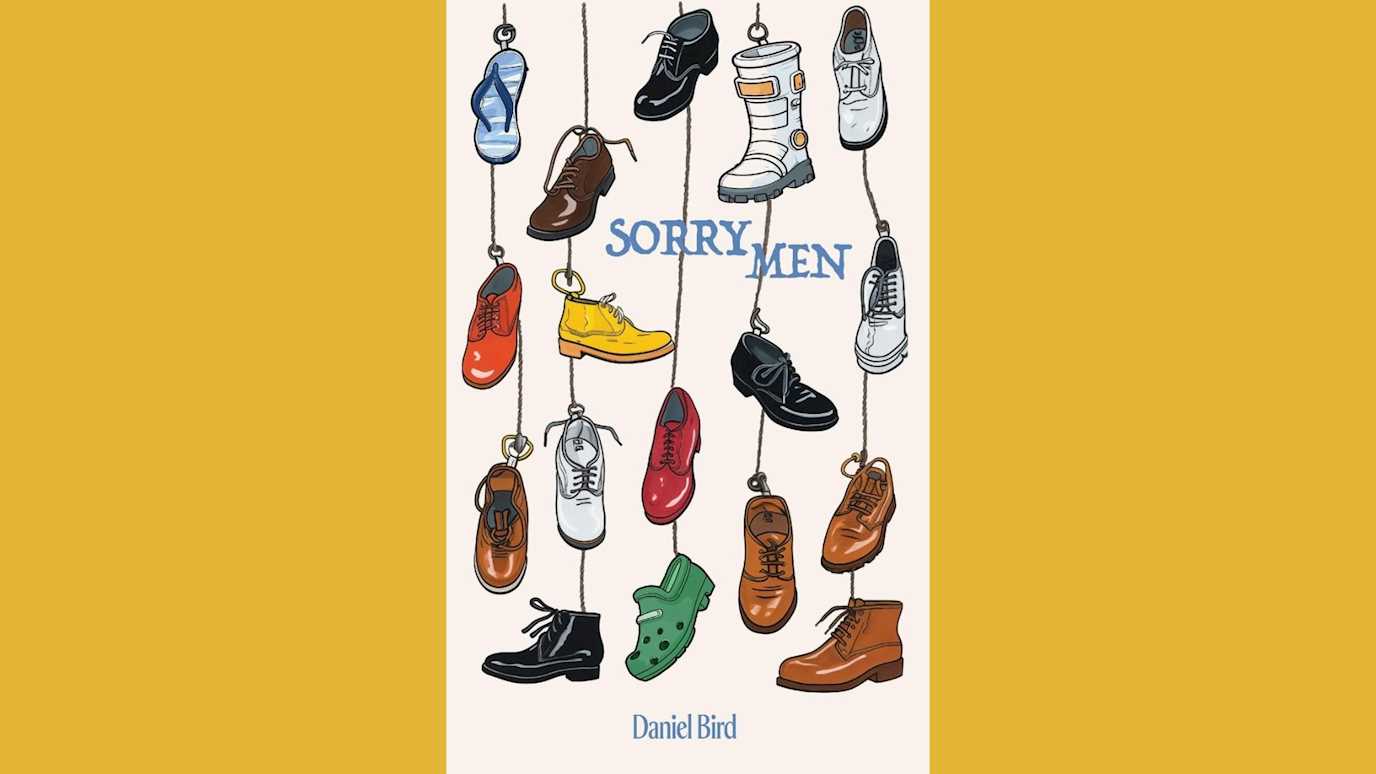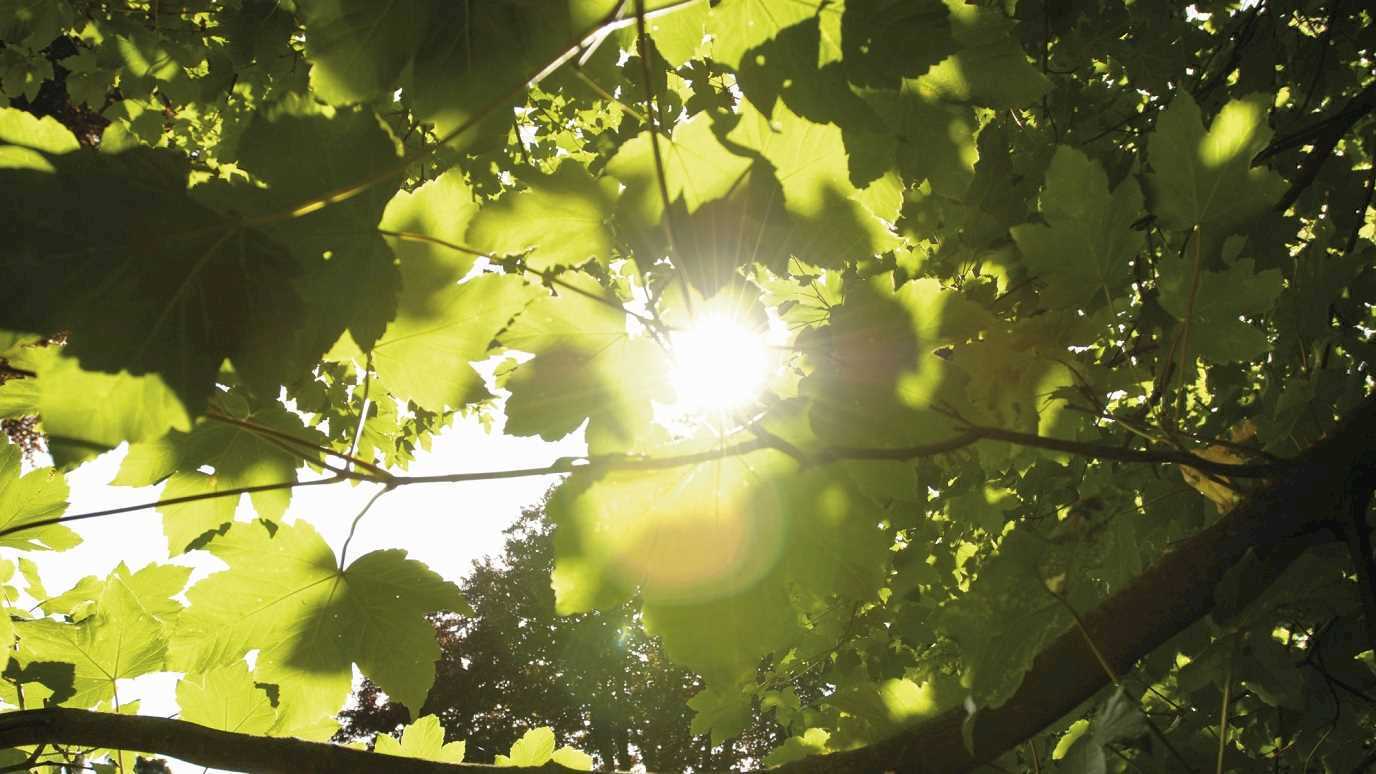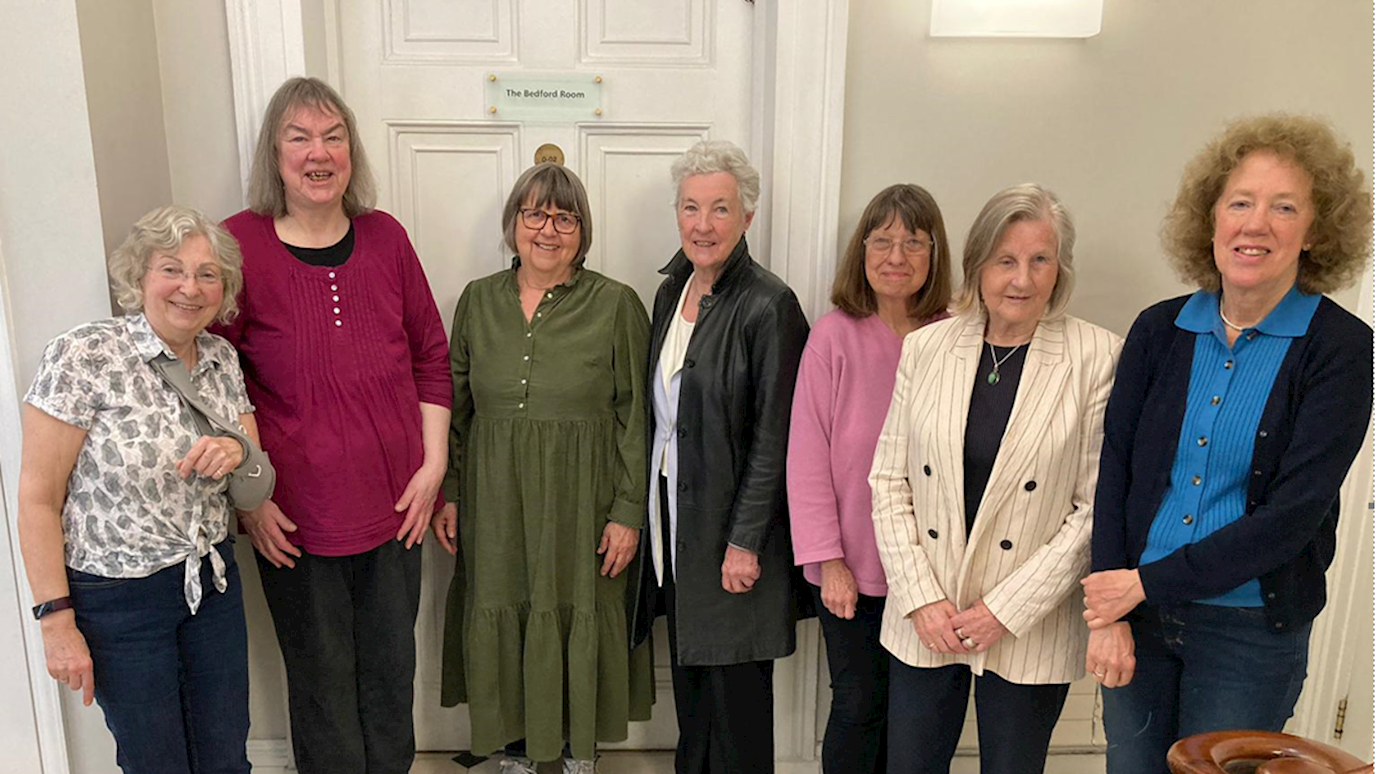Berendina Norton (BMus, Music 1980) was appointed a Member of the Order of the British Empire (MBE) in the 2022 New Year’s Honours list for services to music. We spoke to her to find out more about her honour, and how her time at Royal Holloway shaped her life and career.

Profile photo of Berendina Norton and Matthew Stanley
Berendina Norton always knew she wanted to study for a degree in music, and despite being offered a scholarship at the Royal Academy of Music, she turned it down due to ‘the conservatoires not offering degrees at that time’. She first visited Royal Holloway for her interview and says “I saw how friendly, small and collegiate the campus was – with its 1200 students in those days! I knew I’d found exactly the right place for me. And at that time you were guaranteed a place in Halls for at least two years.”
Berendina enjoyed the close knit community of her degree, “at that time, there were only a dozen or so of us reading for the BMus, and so it was almost as if we each tailored the course to our own particular loves. The lecturers were so generous with their time and their knowledge. To be honest, I wish I could go back and do it all again – I think I would get even more out of it now!”
She tells us that the friends she made whilst at university are still some of her closest friends now. The turbulent backdrop of the late 1970s formed some of Berendina’s memories of her time at Royal Holloway, “they were difficult times for the country, and the power cuts (treading on large bugs in the dark in the breezeblock Brutalist architecture of Athlone), the Green Goddesses on standby during the firemen’s strike, the Iranian Embassy siege, Mrs Thatcher being elected were the background to Students’ Union discos, the Savoy Opera Society and queuing for meals. We were lucky in that our education was free, and against a politically difficult time, I remember having three of the happiest years of my life.”
Berendina’s career aspirations took an unexpected turn in her final year, “I fell down the spiral staircase in Woodlands after a keyboard harmony lesson. I had a hairline crack in my pelvis, and although I recovered completely, that frightened me into thinking how fragile a career as a performing musician would be.” She had intended on doing a postgraduate degree at the Royal Academy of Music, but the accident made her reassess her options. “I ended up in the Visa Department of the Foreign and Commonwealth Office, processing Diplomatic Visas for foreign diplomats and VVIPs, before transferring to the Ministry of Defence where I was quickly moved to be Assistant Private Secretary to Michael Heseltine.”
Whilst Berendina did not originally plan for a Civil Service career, she tells us that her degree “taught me critical thinking, organisation, personal discipline (and the consequences of not having it!) and gave me a qualification which, at the time, not everybody had access to. I am extremely grateful for being able to grow up, which is what I did, at Royal Holloway which was small enough for your mistakes to be noticed but also small enough for them to be forgiven!”
“After a couple of years in the Private Office at the MOD, it was time for me to move to a new Civil Service role. However, I was really missing music by that time, and although I was going to be promoted, I wasn’t happy. I answered an advert in the Guardian for a ‘Composer in Residence’ for a small ceramics company. I got to work on a number of interesting projects, and by the time I left, another alumnus, John Hughes, was working with me. Meantime, my friend and classmate from 1980, Matthew Stanley and I were starting to play piano duets together. We had played at Royal Holloway, but it became more serious and we were invited to do a couple of programmes on BBC Radio 3. From there, other concerts came up and now we have been playing as a duo for 40 years. Matthew, of course, is well known to generations of Royal Holloway students as their piano teacher and as the accompanist for many, many recitals. So we are a ‘home-grown’ partnership!”
Berendina was, however, aware of the perils of trying to survive on a concert income alone. Alongside this, she worked as a musician in her local primary school, as the Director of Music at her parish church and as an examiner for the Associated Board of the Royal Schools of Music. She was then invited to teach at the Royal Grammar School in Guildford, where she was Head of Keyboard Studies for several years. Tragically, her eldest son, who was a pupil at the school passed away from a brain tumour in 2000. This prompted her to think about alternative roles, “I saw a post advertised for a keyboard player and repetiteur for conducting classes at the Royal Military School of Music and applied for it. Before long, the ‘12 hours a week’ post had grown, and I have been an Academic Professor and Piano Professor there ever since! I have been responsible for the training of Army musicians, from meeting them at audition and throughout their careers in various ways: from teaching the history of music and aural training, through to accompanying exams and recitals and playing concertos with the Countess of Wessex’s Orchestra.”
The advice Berendina has for aspiring professional musicians is to be organised, professional and adaptable! She says, “have a clear focus on what it is you want to do – performing, creating, producing, managing – and then be prepared to change it. And never turn down an opportunity, because you don’t know what it will lead to. The other important thing is to be prepared. The number of times I have auditioned or interviewed someone who has only fulfilled half the brief, thinking that it won’t matter, because the half they have prepared is so good. If you are asked for four pieces and scales and arpeggios, don’t think the pieces alone will get you through. And make sure, if you are going for an interview, that you have researched the company or the organisation you are applying to. In short, I guess, be as professional as you can in everything that you do right from the start, because word gets around the music industry faster than you can. Luck gets you a long way, but the more you work, the luckier you will be…”
“In all honesty, I don’t think it has quite sunk in,” she tells us of her MBE. “ As you will see, my career has taken sideways leaps and forward hops, but ever since I left the Civil Service to ‘go back to music’, my one goal has been to encourage others into loving music, whether by teaching, performing, examining, conducting or composing. My husband always says I can’t pass a box without standing on it and trying to persuade people to join in with some sort of event. To receive that letter in the post to say that you are being rewarded for something you absolutely love doing anyway is – well, it’s rather overwhelming, frankly.” In addition to the gratitude for her honour, it is a full circle moment for her musical career “What, for me, is particularly special is that it is Army musicians from the String Orchestra who play the background music for the Investitures, so they will all be there with me on the day. The British Army is the largest employer of musicians in the country and I am proud to have been involved in every aspect of their work.”
With such a varied and impressive career, there is plenty for Berendina to be proud of. One of her proudest moments involved her friend and fellow alumnus Matthew Stanley. “We were asked by the British Piano Duo Association to go to Tokyo in 1996 to represent Great Britain in the International Piano Duo Competition. I suppose it was the piano duettists’ version of the Olympics that year! We won First Prize, and were also the winners of as well as the Kodama Prize and the Ongaku No Tomo Sponsor's Prize (a sort of audience prize). No British duo had won before, and that was certainly something that I look back on with pride.”
Despite taking partial retirement this year, she is full of ambitions for the future and goals to achieve. “I remain fiercely determined to ensure that everyone has equal access to music education, and that it should be fit for purpose. For some people, that means learning to play ukulele in primary school and progressing to playing in a local group or band: some don’t want to read music but want to perform in a different way. Some, though, will want to play the violin to the highest possible standard and that is different, expensive and more specialist. Some will want to play in a youth orchestra. Some will want to do advanced music theory. Some want to make their own music using digital means in a wholly different way. All of these count and all of these matter, and if we don’t do something drastic quite soon, music will disappear. Western Classical music is what I know, and that is disappearing out of schools at an appalling rate, and it isn’t being replaced by anything else, either. We have to find a way of doing things differently. When I was little, we had ‘Time and Tune’ on Schools Broadcasting bringing music into primary schools every week, and nearly all the teachers could play the piano. Music was an intrinsic background to the school day. Those days are gone, whether we like it or not, and if many schools are not confident about how to encourage and create live music themselves anymore then we need to find different ways of getting more sorts of different music to more children by more means, more often and from Day One. This is a big movement! My task, therefore is to find a way of being a part of that.”
The seeds for her passion for music education were sown at Royal Holloway. “I knew I wanted to learn more about music, more about myself and more about life in general. I had led a pretty quiet rural life up until that point, and the lovely thing about Royal Holloway was there was a real sense of community and with that came the usual disagreements and anxieties and difficulties. However, it was easy to make friends with students from across different degrees.” The sense of community was supported by the staff at Royal Holloway, “at that time the College appointed its first ever Student Counsellor, and even those of us who never had formal appointments with her felt that there was an overall sense of students being nurtured. Maybe I was simply lucky, but if there were gaps I never fell through them: I had a lot of ups and downs, but I learned a lot about living with other people and how to negotiate my way through what that meant. I spent three years living in Athlone in the ‘New Halls’, which was unplastered and the ‘bathrooms’ were six adjacent basins on a wall, one toilet, one shower, one bath and one, er, ‘kitchenette’, all in the same Brutalist breezeblock, per dozen or so rooms. I’m sure today’s students will be reeling in horror. Like I say, I grew up fast!”
Looking back over her time at Royal Holloway also prompted Berendina to think of the biggest regret of her student life. “Over the last 20 years, I have developed a new obsession – the Victorian Gothic. I studied at Royal Holloway and I worked at the House of Commons and I was completely oblivious to the glory of my surroundings. I groan at my student self every time I am within eyesight of Founders’ Building. I feel that I was so fortunate to have spent three years of my life there at the time I did. I am sure that all alumni feel that they were there ‘in the best of times’. I certainly do. I loved it, and I would love to do it all again. Thank you, in retrospect, to Professor Spink, Dr Pike, Dr Chew, Dr Dack, Erik Levi and the late Brian Dennis. It’s a big debt I owe.”
























